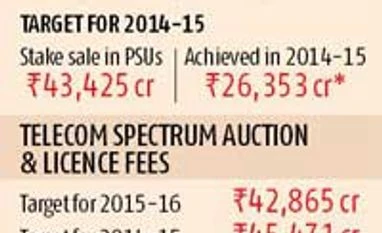The Narendra Modi government has revived the idea of strategic disinvestment first proposed by the predecessor National Democratic Alliance (1999-2004) as a major component of non-tax revenues in Budget 2015-16. Together with proceeds from auctions of telecom spectrum and licence fees, the government hopes to garner Rs 1,12,365 crore from these two sources as part of the effort to bridge the fiscal deficit in 2015-16.
Strategic disinvestment - or the sale of the government's majority shareholding in select companies - is expected to be a major element of non-tax revenue in addition to incremental stake sales in public sector units (PSUs). Making a distinction between the two forms of divestment, Finance Minister Arun Jaitley said in his speech, "The Budget reflects considerable scaling up of disinvestment figures. This will include both disinvestment in loss-making units and some strategic disinvestment."
Accordingly, he has sharply raised the disinvestment target from the current year's Rs 43,425 crore to Rs 69,500 crore for 2015-16. Of this, Rs 41,000 crore is expected from PSU stake sales and Rs 28,500 crore from strategic disinvestment.
The 2015-16 target is more than double the government's earning of Rs 26,353 crore so far from stake sales in Coal India (10 per cent) and Steel Authority of India (five per cent). Another Rs 5,000 crore or so is expected in the remaining one month from stake sales in other PSUs.
BUDGET AT A GLANCE
Companies that have already been identified for stake sale include Indian Oil Corporation (IOC), National Aluminium Company (Nalco), Bharat Heavy Electricals Ltd (Bhel), NMDC and Dredging Corporation, among others. There are close to 30 listed PSUs in which the public holding is less than 25 per cent and the Securities & Exchange Board of India (Sebi) has proposed the government reduce its stake in these companies to 75 per cent or below by 2017.
This apart, from telecom spectrum auctions and licence fees, the government is targeting Rs 42,865 crore from auction of 800 and 900 MHz spectrum and licence fees in 2015-16. This is against a targeted Rs 45,471 crore for 2014-15 from these sources. No revenue has been booked from spectrum auctions because they are yet to take place. The auction is slated for March, but the final result can be announced only after Supreme Court approval.
In the case of coal block auctions, which has been listed by Jaitley as one of the three achievements of the government, the proceeds will go to the states and not the Centre.
Strategic disinvestment - or the sale of the government's majority shareholding in select companies - is expected to be a major element of non-tax revenue in addition to incremental stake sales in public sector units (PSUs). Making a distinction between the two forms of divestment, Finance Minister Arun Jaitley said in his speech, "The Budget reflects considerable scaling up of disinvestment figures. This will include both disinvestment in loss-making units and some strategic disinvestment."
Accordingly, he has sharply raised the disinvestment target from the current year's Rs 43,425 crore to Rs 69,500 crore for 2015-16. Of this, Rs 41,000 crore is expected from PSU stake sales and Rs 28,500 crore from strategic disinvestment.
The 2015-16 target is more than double the government's earning of Rs 26,353 crore so far from stake sales in Coal India (10 per cent) and Steel Authority of India (five per cent). Another Rs 5,000 crore or so is expected in the remaining one month from stake sales in other PSUs.
BUDGET AT A GLANCE
Companies that have already been identified for stake sale include Indian Oil Corporation (IOC), National Aluminium Company (Nalco), Bharat Heavy Electricals Ltd (Bhel), NMDC and Dredging Corporation, among others. There are close to 30 listed PSUs in which the public holding is less than 25 per cent and the Securities & Exchange Board of India (Sebi) has proposed the government reduce its stake in these companies to 75 per cent or below by 2017.
This apart, from telecom spectrum auctions and licence fees, the government is targeting Rs 42,865 crore from auction of 800 and 900 MHz spectrum and licence fees in 2015-16. This is against a targeted Rs 45,471 crore for 2014-15 from these sources. No revenue has been booked from spectrum auctions because they are yet to take place. The auction is slated for March, but the final result can be announced only after Supreme Court approval.
In the case of coal block auctions, which has been listed by Jaitley as one of the three achievements of the government, the proceeds will go to the states and not the Centre.
)